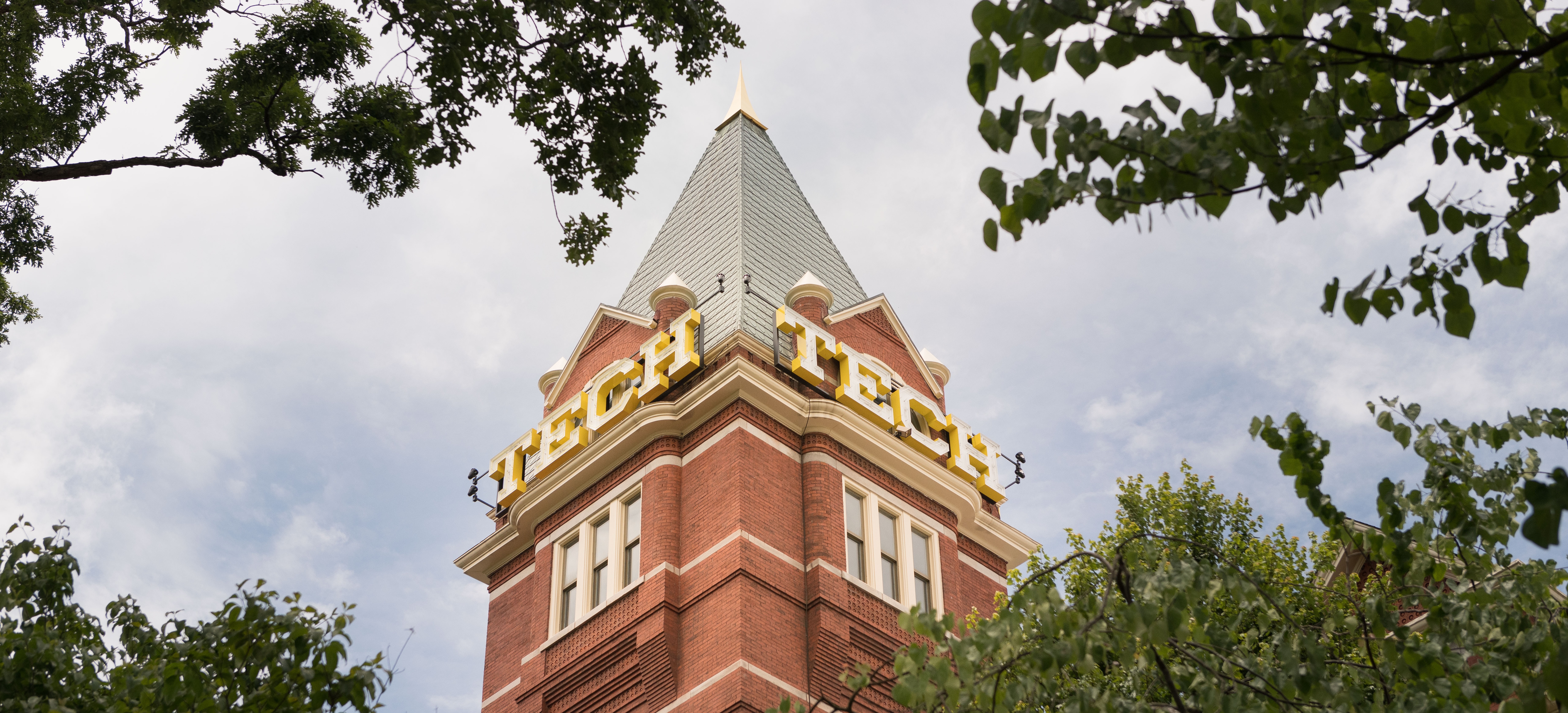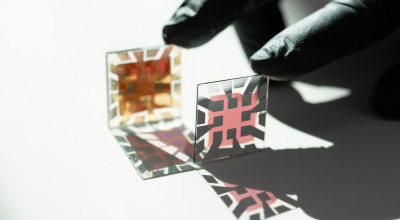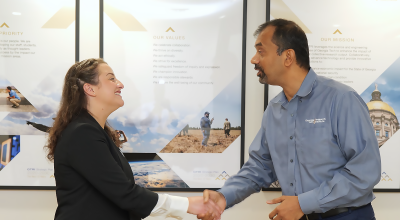
The Georgia Institute of Technology (Georgia Tech) has always attracted intelligent, hard-working, innovative, entrepreneurial students who love to ask, “Why?” Their curiosity and dedication contribute to their success as Georgia Tech graduates who are committed to improving the human condition and creating a better future through “Progress and Service.”
The Georgia Tech Research Institute (GTRI) was designated a University Affiliated Research Center (UARC) by the Director of Defense Research and Engineering (DDR&E), Office of the Secretary of Defense (OSD). UARCs are organizations affiliated with universities or colleges that are established by the Department of Defense (DoD) to maintain essential research, development, and engineering "core" capabilities; maintain long-term strategic relationships with their DoD sponsors; and operate in the public interest, free from real or perceived conflicts of interest.
The UARC classification uniquely positions GTRI with the ability to mentor students and hear their fresh ideas and perspectives. After working with GTRI through internship and co-op programs, many students choose to make a career at GTRI and continue calling Georgia Tech their home.
As Georgia Tech’s Homecoming weekend rolls around, alumni prepare to celebrate traditions, connect with classmates, and make new memories at their alma mater. When talking to alumni of Georgia Tech, a reoccurring theme is pride. Graduates look back on their collegiate years with fondness and a sense of accomplishment. They’ve held onto the lessons learned at Georgia Tech – not just, for example, the laws of thermodynamics, but how to work on a team, communicate effectively, and be a thought leader.
Brooke Beckert, James Corbett, and Stuart Michelson all graduated in different Georgia Tech classes. Still, their experiences are unified by their student jobs at GTRI turning into full-time, fulfilling careers.
Brooke Beckert
Brooke Beckert received her bachelor’s and master’s in materials science and engineering from Georgia Tech in 2010 and 2012, respectively. While completing her B.S., Brooke started as an undergraduate research assistant in GTRI’s Electro-Optical Systems Laboratory (EOSL). In 2013, she started her full-time position in GTRI’s Advanced Concepts Laboratory (ACL). Now, as a senior research engineer and a project manager, Brooke applies her technical research and strategic planning skills to bring dynamic change to GTRI.
Did going to Georgia Tech help you get a job at GTRI?
“Yes. Several GTRI research faculty are also adjunct professors in various schools within the Institute. Several taught undergraduate courses in the School of Materials Science & Engineering and used some of their projects as real-world examples of what we discussed in class. I thought that was great and felt it really helped me grasp the concepts.”
In what ways are you proud of being a Georgia Tech graduate?
“I am proud to be a Georgia Tech graduate because I know that we receive some of the most rigorous engineering training available. As I’ve worked with folks from other universities over the course of my professional career, I’ve found that Georgia Tech grads really are top-notch. We often have great attention to detail, are thorough, and versatile.”
James Corbett
When James Corbett was working towards his Bachelor of Science in electrical engineering, he joined GTRI as an undergraduate co-operative education student. After completing his bachelor’s in 1993 and a Master of Science in electrical engineering degree in September of 1995, it was a natural transition to stay at GTRI and take the role of research engineer I. Nearly three decades later, and with the new title of principal research engineer at GTRI’s Electronic Systems Laboratory (ELSYS), James still calls GTRI and Georgia Tech home.
Do you still participate in activities on campus?
"Over the years, I have participated in activities on and off campus. Of course, my wife and I enjoy going to football games as well as men's and women's basketball games. Having been a Tech fan since the age of 10 or so, I have been going to games since the 1980s. I remember my dad taking me to games in high school and still enjoy watching games on TV with him at his assisted living home. I was president of the Conyers Area Georgia Tech Alumni Network for two years and worked on the board for that network for several other years. I particularly enjoyed interviewing high school senior applicants for the scholarships that we presented. My enjoyment came out of seeing people who were seeing Georgia Tech the way I once did: eager to get started and full of questions. Like in any interview, we would ask the applicants if they had any questions about us as the interviewers were all Georgia Tech alumni. One year, we noticed a trend that made us laugh. Each applicant asked us, 'Is it really as tough as I hear that it is?'"
In what ways are you proud of being a Georgia Tech graduate?
"I am proud of the impact that Georgia Tech has on the state, nation, and world. The school motto is "Progress and Service," and I think that we deliver on that. Of all of the schools of the University System of Georgia, Georgia Tech has the largest economic impact on the state at $4 billion, according to the latest survey. When I look out my office window toward Tech Square, I see the development that has coalesced around Tech Square and realize that companies have centered on Georgia Tech to be near the talent that this school produces. I think of the defense work that GTRI performs to protect the men and women that protect this country and its allies around the world. I see the work that we do in underdeveloped nations around some of the most basic necessities that we take for granted, such as clean water and sanitation. All of that makes me realize that Georgia Tech is not just a state asset, but a national and international asset."
Across your education and career at Georgia Tech, you’ve witnessed a lot of history. Is it important to remember that history, and how might we go about that?
"One of my hobbies over the years has been collecting Georgia Tech memorabilia, some of it sports-related but mostly school-related. My biggest collection is of Blueprint yearbooks. Of the some 110 years that they produced yearbooks, I have editions from about 80 years. These editions span the gaps from World War I to the Great Depression to World War II to the Cold War to the Civil Rights era through the start of the 21st Century. You can see the change in Atlanta as well as the campus as it has grown. I also have a leather-bound edition of The Technique student newspapers from the 1934-1935 academic year. Over the years, I became a big supporter of the Georgia Tech Living History Program, which is located at the Georgia Tech Alumni Association. They do a great deal of work documenting the early days of Georgia Tech and even have a recorded interview of the daughter of the first Georgia Tech graduate. Not many schools that are 136 years old have something like that. I think it is vitally important to remember from where we have come to help us determine where to go in the future."
Stuart Michelson
Stuart Michelson is a human systems engineer at GTRI, capturing and leading research programs that are forging new paradigms of human-machine interaction for complex battlefield environments. He received a B.S. in Science, Technology, and Culture in 2011, followed by a M.S. in Human Computer Interaction in 2013, both from Georgia Tech. Early on in his collegiate education, Stuart got involved with GTRI through the co-op program. This program offers students extensive opportunities to participate in different scientific and technological endeavors, use state-of-the-art equipment and rapidly improve technical and leadership skills.
Since graduating from Georgia Tech, what have you been working on?
“Most notably, my work has included the creation of novel user interfaces for the control of multiple heterogeneous unmanned vehicles, mission planning systems, anthropometric analyses, and human-centered analyses to drive designs of complex systems, including ground vehicles, aircraft subsystems, and wearable sensors. My research has allowed me to develop a reputation as a subject matter expert in human factors and human experience with unmanned systems internationally, widely publish on these topics, teach Georgia Tech Professional Education courses, and enabled my success as the Associate Head of the Human Systems Engineering Branch at GTRI. In this capacity, I lead collaborations across Georgia Tech to connect the voices and world-renowned technical expertise we are known for to spark new innovations from a human systems perspective.”
Did going to Georgia Tech help you get a job at GTRI?
"As research faculty at Georgia Tech, my Georgia Tech education has always been closely associated with my career path. Georgia Tech afforded me the opportunity to experience what a career at Georgia Tech would be like through the co-op student and graduate research assistant programs as a student and helped shape the direction of my future career under the mentorship of world-renowned experts in my field. I enjoyed as a student being able to immediately apply what I was learning in the classroom to real-world problems at the Georgia Tech Research Institute as a student employee. As a professional, my association with Georgia Tech has afforded me the chance to brief on technical topics to international audiences and exclusive government entities such as DARPA. I do so as a proud Yellow Jacket every time. I am proud to be associated with Georgia Tech and consider it an honor to have been given a chance to make the Institute the home for my career."
In what ways are you proud of being a Georgia Tech graduate?
"My association with Georgia Tech has led to my being featured as an expert on various technical topics in the marketing campaigns of the Association for Unmanned Vehicle Systems International (AUVSI). Georgia Tech's [previous] tagline of "Creating the Next" was one I really do take to heart. I am inspired by the opportunity to develop and lead in new business areas as a professional at Georgia Tech. I find it incredibly fulfilling to have a vision or idea and then see it become an operational reality. A career at Georgia Tech has made this possible for me over and over again. I can literally take my ideas and see them manifest in research program opportunities that I helped to connect to Georgia Tech. Best of all, I get to do this alongside some of the greatest professionals and experts I have ever known at the Institute. I am inspired daily by the quality of the research faculty I get to change the world alongside. It is inspiring to know that this pattern can continue to repeat over the remainder of my career, and I look forward to research potential I can continue to foster at Georgia Tech."

Georgia Tech Research Institute (GTRI) is the nonprofit, applied research division of the Georgia Institute of Technology (Georgia Tech). Founded in 1934 as the Engineering Experiment Station, GTRI has grown to more than 2,800 employees supporting eight laboratories in over 20 locations around the country and performs more than $700 million of problem-solving research annually for government and industry. GTRI's renowned researchers combine science, engineering, economics, policy, and technical expertise to solve complex problems for the U.S. federal government, state, and industry. Learn more at https://www.gtri.gatech.edu/ and follow us on LinkedIn, Twitter, Facebook, and Instagram.
Writer: Katrina Heitz



